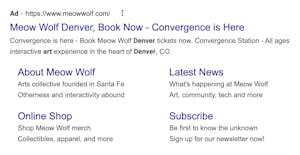
If you have experience with pay-per-click (PPC) ads, you’ve undoubtedly heard the term Quality Score. Understanding what elements affect your Quality Score is a crucial component of PPC marketing as these elements impact the cost and effectiveness of your paid search campaigns.
So what exactly is a Quality Score? In short, it’s a numeric ranking scale from 1 to 10 that is intended to measure the quality and relevance of both your paid keywords and their respective PPC ads.
Why does this score matter? Optimizing your ads for a higher Quality Score can increase your overall return on investment (ROI). Generally speaking, a higher Quality Score leads to a lower cost per click and cost per conversion, meaning you get better results for a lower price. If your ads are not performing the way you expected, it’s possible that they’re not optimized to achieve a high Quality Score. Rather than getting discouraged, you can audit each element to give your score a boost.
This guide will offer some tips on how to improve your Quality Score. While there are a variety of factors that can influence your Quality Score, this guide will focus on the three core factors Google takes into account when determining your score:
- Landing page experience
- Ad relevance
- Expected clickthrough rate
Improve Landing Page Relevance and Experience
Once users decide to click on your ad, the landing page it takes them to will be the deciding factor that will determine whether they convert into a customer. If you focus all your efforts on setting up your ad campaign and don’t put a lot of thought into the landing page, you’ll be doing yourself a disservice. When optimizing your landing page, make sure you’re thinking about how it’s going to benefit the user, how it can help your Google rankings, and of course, how it benefits your business. Here are a few tips to improve the landing page experience.
- Find the right keywords: Keywords are the foundation of any PPC campaign. Without proper keyword research, all other components will suffer. The first step is to conduct extensive keyword research for your industry and business. If you are using Google Ads, you can also take advantage of the Keyword Planner tool built into the platform! Once you have your keywords selected, be sure to sprinkle them throughout the landing page to help rankings by telling Google that this page has content that is relevant to the query.
- Pro tip: Don’t forget that landing pages should also match the user’s search intent. You can learn more about this topic with this guide.
- Keep the content clear and concise: When users click on an ad, they already have a good idea of what they want to find. They don’t want to get lost in irrelevant copy and struggle to find the product or service they’re looking for. Make sure your content is clear and to the point. We recommend following this guide to learn the anatomy of a landing page.
- Check your site speed: Pages that take longer to load can result in users bouncing off, which can also affect the expected clickthrough rate (more on this in a moment). That’s why it’s important to check the load time on your landing page and take steps to improve it if it’s longer than average. Try to follow the industry standard of no more than 3 seconds to load a page.
Improve Ad Text Relevance
Writing your ad text isn’t just about coming up with a punchy sentence. You need to make sure that your text is optimized so that your ads appear in relevant searches. Follow these tips to ensure your ad text is helping you attract the right customers.

- Incorporate main keywords: Start by ensuring your top keywords are incorporated into the ad copy. Ideally, they should be located in the headline, somewhere in the body, and in the display URL. Keywords that match the user’s search appear bold.
- Match messaging: While PPC ads do allow you to inject a level of creativity into your copy, the main goal is for the ad copy to match the messaging of your landing page to eliminate any surprises when a user clicks on the ad. They should find exactly the kind of information they expect from reading your ad when they arrive on your landing page, or they’ll probably bounce off.
- Grouping keywords: Sometimes you’ll run into a creative block when writing your ad copy, or you may not even know where to begin writing. We’ve all been there. A great place to start is by grouping your keywords by theme. For example, if you’d like to promote your corporate team building activities and your public food tours, each of these would belong in a different ad group. Once you’ve organized your ad groups, you’ll have a clear idea about what each ad should accomplish, and it’s easier to start writing ads focused on each group’s theme. This more targeted approach to writing can increase your Quality Score by ensuring each ad is relevant to the theme.
- Match types: PPC ads are triggered when users enter certain search queries into a search engine. However, if match types aren’t specified, those ads might not match the search. It’s crucial to understand match types in order to show your ads to the right users. (Match types can also impact your expected CTR, which we cover in the next section.) A broad match can invite unqualified traffic to your site, as this match type allows your ad to show up for any search query that has the keywords, in any order. On the other side of the spectrum, exact match keywords cost more per click, so you have to make sure that the ROI is enough to justify the expense. Try to find a balance between modified broad match (using negative keywords to help eliminate unqualified traffic) and exact or phrase match to ensure ad relevance, always keeping an eye on the cost and returns to make sure the ads are working for you.
Improve Expected Clickthrough Rate
The third factor that Google considers for your Quality Score is your expected clickthrough rate, which measures how likely it is that users will click on your ad when it’s shown for a particular query. Expected CTR takes into account past ad performance, assuming that the search term will exactly match your targeted keywords. You can learn more about how it works on Google’s help page. Here are a few tips to improve your expected CTR.
- Regularly audit and update your negative keywords list: As your ads run and you learn more about what terms are driving the most clicks, you can refine your negative keyword list to weed out any unqualified traffic. Use this checklist for more weekly and monthly checks for your ads.
- Cut keywords that are not driving as much traffic or have lower relevance: You don’t want to waste any portion of your budget on keywords that aren’t driving traffic to your site. Keep an eye on performance and remove any keywords that aren’t helping you achieve your goals.
- Verify that your ad copy matches the keyword group the ad is in: For example, if one of your ad groups is for beer tours, then all the copy for those ads should be relevant to that theme. An ad for a street food tour would not belong in this ad group.
- Incorporate ad extensions into your ads: Ad extensions allow you to include more information in your ads, such as location, links to certain pages on your website, and price. This added information can help improve your CTR by answering customers’ questions and giving them additional ways to interact with you. They also give your ad greater visibility because they take up more space in the SERP. Explore the ad extensions that are relevant to your business and start testing them out!

It can take some trial and error to discover what elements are affecting your ads’ Quality Score, but by auditing these three elements and trying out a few of these tips, you can start to improve your ads and work toward a better score and increased ROI. For more digital marketing tips, check out our guide to budgeting your marketing resources.


